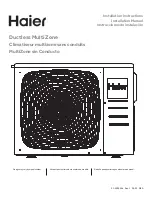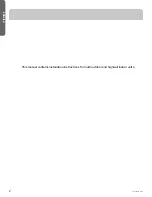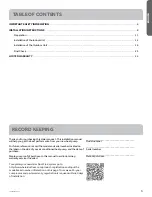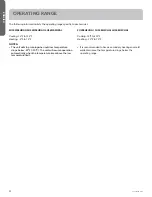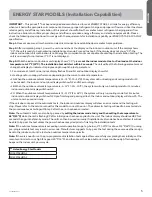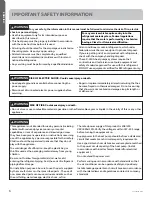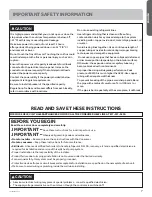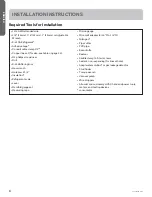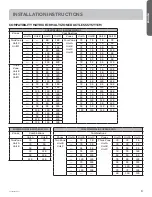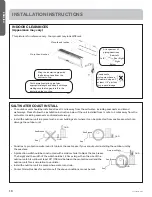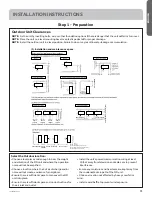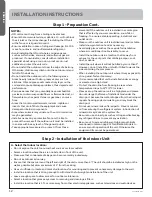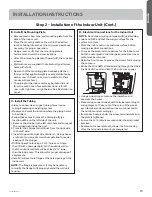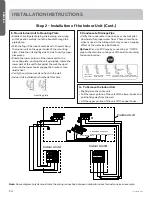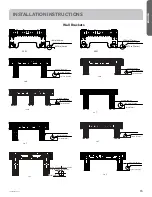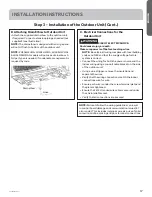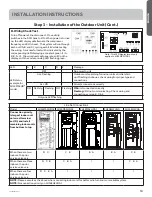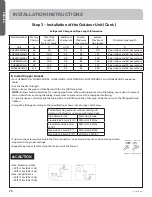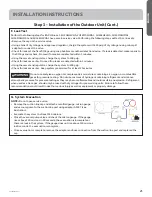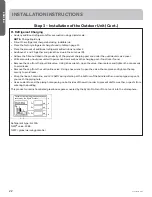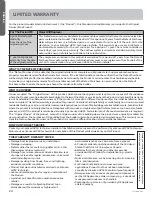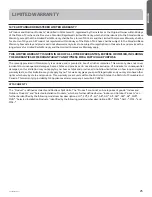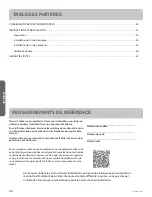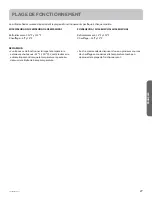
12
31-5000564 Rev. 1
ENGLISH
Step 2 - Installation of the Indoor Unit
A. Select the Indoor location:
• Do not expose the unit to unusual heat sources or steam outlets.
• Select a location where there are no obstacles in front of the unit.
• Make sure that condensate drainage can be conveniently routed away.
• Do not install near a doorway.
• Ensure that the space around the left and right of the unit is more than 4”. The unit should be installed as high on the
wall as possible but allow a minimum of 4” from the ceiling.
• Use a stud finder to locate and mark stud locations for mounting and to prevent unnecessary damage to the wall.
• Install in a location that is strong enough to withstand the full weight and vibration of the unit.
• Leave enough space to allow access for routine maintenance.
• Select a location that gives easy access to removing and cleaning air filters.
• Install in a location that is 3 ft. or more away from other electrical appliances, such as televisions and audio devices.
Step 1 - Preparation Cont.
NOTES:
• OD unit cannot hang from a ceiling or be stacked.
• Ensure that accumulated snow, debris, etc… will not block
the air inlet or the coil exchanger if installing the OD unit
with a fence or rail guard around it.
• Ensure ventilation in case of refrigerant leakage. R-410A
is a safe, nontoxic, and nonflammable refrigerant.
• Avoid installing the OD unit where corrosive gases,
such as sulfur oxides, ammonia, and sulfurous gas are
produced. If unavoidable, consult with an installation
specialist about using a corrosion-proof or anti-rust
additive to protect the unit coils.
• Do not install the outdoor unit near the edge of a balcony.
Otherwise, children may climb onto the outdoor unit and
fall off of the balcony.
• Do not install the outdoor unit in the following areas:
Areas heavily laden with oil or greasy vapors such as
kitchens. Oils and grease will create sticky layer on the
coil and also cause drainage problems, thus degrade unit
performance.
• Corrosive areas that can potentially have combustible
gas leaks, contain suspended fibers or flammable dust, or
flammables such as paint thinner or gasoline can cause
fires.
• Areas that contain small animals, rodents, reptiles or
insects that can infiltrate the equipment and cause
damage to internal components.
• Area where animals may urinate on the unit or ammonia
may be generated.
• Install as necessary a protective fence or the like to
prevent their access if the outdoor unit must be installed
in an area within easy reach of the general public.
• Take appropriate measures to protect it from those
elements If the outdoor unit is installed in a cold region
that is affected by snow accumulation, snow fall, or
freezing. To ensure a stable operating, install inlet and
outlet ducts.
• Make sure the outdoor unit is installed level and is stable.
Install snow protection hood as necessary.
• Avoid salty places such as the seaside for installation
where air conditioner trouble is liable to occur.
• Install the outdoor unit in a location that is away from
exhaust or the vent ports that discharge vapor, soot,
dust, or debris.
• Install the unit where it will not be tilted by more than 3°.
However, do not install the unit with it tilted towards the
side containing the compressor.
• When installing the outdoor unit where it may exposed to
strong wind, fasten it securely.
• It is recommended that unit be installed under a canopy
or elevated on a high stand.
• Protect the drain line from freezing in areas where
temperature drops to 32°F (0°C) or lower.
• Please set up the outdoor unit in a high place and please
do not arrange the frame of installed stand under the
drain port, because the water dropped from the drain port
repeats freezing and accumulating, and may block the
drain port.
• Do not use mineral oils on flared parts. Prevent mineral
oil from entering the refrigerant system. Introduction of
mineral oil may reduce the system life.
• Be sure to use an inert gas such as nitrogen while brazing
any refrigerant lines to prevent any oxidation
• Be sure not to exceed refrigerant tubing length limits
mentioned in table on page 15 for different models to
ensure smooth operation of the unit. Otherwise the
equipment life cannot be guaranteed.
INSTALLATION INSTRUCTIONS

